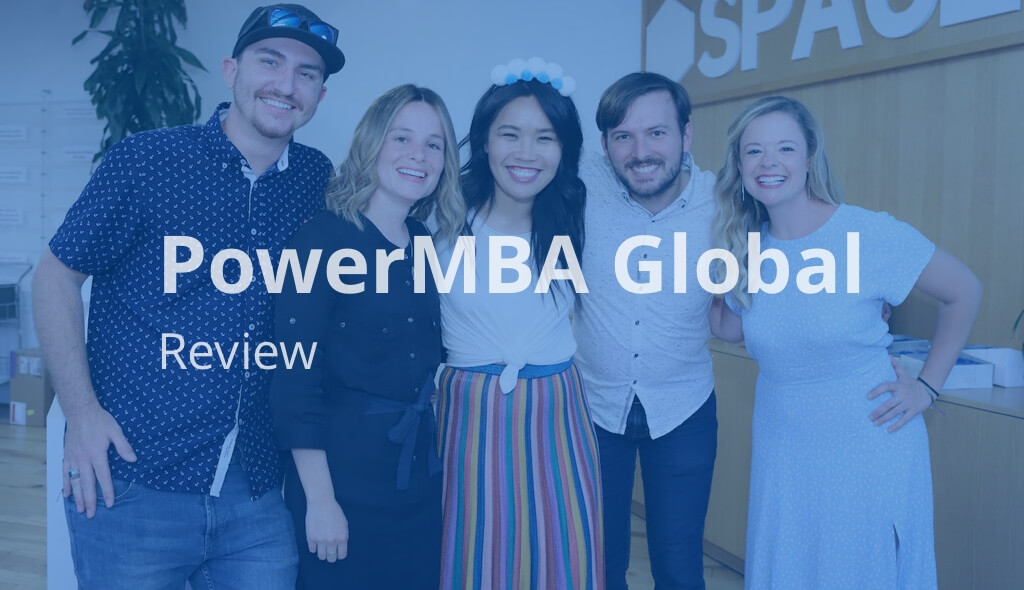Did you skip college and go right into a career? If so, getting an MBA without a bachelors isn’t simple — but it is possible.
At a high level, there are three routes to an MBA without a bachelors in 2026:
- Paying for an EMBA program as a mid-career executive; these are short-term and extremely expensive.
- Studying in a country with less rigorous qualification requirements, such as Canada.
- Applying as a celebrity success story, e.g. an Olympic athlete or venture-backed CEO.
Even if you can make one of these routes work, there are some compelling arguments against pursuing an MBA without an undgrad degree.
For starters, MBA programs outside the top ten US programs have increasingly lower value and higher costs. On top of that, Ivy-league programs like Harvard and Columbia only open to low-education students in extreme cases, making them a no-go for those of us with non-traditional backgrounds.
On the bright side, there are many ways to fast-track up the ladder that don’t require an MBA (especially in tech and tech-adjacent fields).
I suggest the following as first steps before considering an MBA:
- 🤝 Build your network through private clubs. Most early and mid-career professionals will get better networking and prestige opportunities through means-tested country clubs or Soho Houses.
- 🎓 Enhance your education through industry-specific coursework. Those more interested in the education side of an MBA can consider applying for work-sponsored study through their employer, or joining a private executive education group such as Pavilion.
If that’s not quite your cup of tea and you’re still keen on an MBA — check out the examples and directions compiled below.
- If you can get an MBA without having first completed a business degree or any degree at all;
- What the differences are between an MBA and EMBA;
- What to look for in an MBA/EMBA;
- The top 3 MBAs and EMBAs that don’t require a bachelors degree;
- The process of getting into an MBA program; and
- If an MBA is right for you in the first place.
Can you get an MBA without an undergraduate degree?
MBA students without undergraduate degrees are permitted by some schools including Ivy Leagues like Dartmouth and Cambridge. However, the practice is uncommon, particularly in the US. Exceptions are generally celebrities or otherwise exceptional talents, while EMBA programs have become a popular workaround for accomplished executives with nontraditional backgrounds.
Overall, you should go into this knowing that it is quite rare for an individual to get into one of the top traditional MBA programs without having first completed an undergraduate degree. The following are a few examples of people who have completed traditional MBA programs without a bachelors degree:
- Emily Brydon (2012) and Henry Oakes (2017) received an MBA at the Imperial College Business School in London, England
- Michael Gallant (2017) received an MBA at Institut Européen d’Administration des Affaires (INSEAD) in Fontainebleau, France
Now, if you look into their stories, these individuals are as unique as them being accepted into the MBA programs: Emily Brydon competed as a skier at three Winter Olympics for Canada; Henry Oakes co-founded a lottery game company; and Michael Gallant served as an Israeli Navy SEAL.
If you’re as unique as them, maybe it’s possible; if you’re not as unique as them, it’s a lot less likely that you’ll get into one of the top traditional MBAs without an undergraduate degree. Nonetheless, since it has happened before — including at Wharton, London Business School, Columbia Business School, and the University of Chicago’s Booth School of Business — it can theoretically happen to you.
If you didn’t notice what the above-mentioned examples had in common, read on to learn the best routes to a traditional MBA (and Executive MBA or EMBA) without a bachelors degree.
Can you get an MBA without a business degree?
While most MBA programs require or expect students to have an undergraduate degree, there is almost never a requirement that the bachelors degree be business-specific. In fact, in 2021, 44% of prospective MBA students in the US had completed undergraduate degrees in subjects other than business/economics.
Not having previously earned a business degree shouldn’t dissuade you from pursuing an MBA. What matters most is that you’re a good student who’s capable of handling masters-level coursework.
The differences between an MBA and EMBA
In this article, we’re going to discuss both MBAs and “EMBA” programs.
EMBAs are effectively a way for busy, accomplished executives to augment their formal education by purchasing a low-residency post-grad education.
Cynically, they are sometimes viewed as a way of “buying your way into Harvard,” as Ivy Leagues schools charge $40,00–90,000 or more for a relatively light courseload compared to a traditional MBA.
However, if your goal is simply to network with other executives and get an Ivy League badge for your CV, these programs are well worth considering.
The following table contrasts the general differences between MBAs and EMBAs:
| MBA | EMBA | |
|---|---|---|
| Qualification Received | Master of Business Administration | Master of Business Administration |
| Coursework | More theoretical than practical | More practical than theoretical |
| Duration | About one to two years | About two (or slightly more) years |
| Delivery | Primarily full-time (but also offered part-time and distance/online) | A mix of part-time, sprints of full-time, and/or self-study (can also include educational trips and/or events) |
| Tuition/Fees | Average of about $60,000 | Average of $82,883 |
| Entry Requirements | Focuses primarily on educational background | Focuses primarily on work background |
What to look for in an MBA/EMBA
As you consider your options, it’s important to know what exactly to look for in an MBA/EMBA. While individuals without a bachelors degree can’t be too choosy and are more at the mercy of who will accept them, prospective students typically evaluate their options based on the following criteria:
- The degree should be accredited. The most important accreditation for MBAs in the United States is the Association to Advance Collegiate Schools of Business (AACSB), while its the Association of MBAs (AMBA) in the UK and EFMD Quality Improvement System (EQUIS) in the European Union.
- The reputation of the university (including the faculty).
- The total costs of the program.
- The duration of the degree.
- The delivery format and time commitment.
- The coursework (i.e. topics covered; could also include a major or specialization).
- Other relevant criteria (e.g. specialties, resources, selectivity, employment rate, average graduate salary, etc.)
Top 3 MBAs and EMBAs that don’t require a bachelors degree
The following charts give you the top three MBAs and EMBAs that clearly state they do not require a bachelors degree.
Notes: The Financial Times rank comes from the “Global MBA Rankings” and the US News rank comes from the “Global Economics and Business Rankings”; universities may rank higher in other/more specific categories (e.g. Warwick Business School ranks #1 in Online MBAs).
Traditional MBAs that don’t require undergraduate degrees
If you were hoping to stay with a US college for your MBA, unfortunately, it’s “extraordinarily rare” that someone gets into a program without qualifications. You need to show more than basic willingness to learn; MBA programs are valued because they’re hard to get into, after all.
Conversely, you do have a shot at a very well-regarded MBA in the UK as many top schools consider applicants with “nontraditional backgrounds.”
| Business School/University | Editorial Rankings (2021) | Nontraditional Backgrounds Exception |
|---|---|---|
| Judge Business School—University of Cambridge | #16—Financial Times #17—US News | "If you do not meet [the undergraduate degree] requirement, we can still consider your application, but we would need to see a strong GMAT or GRE score." |
| Warwick Business School—University of Warwick | #32—Financial Times #25—US News | "We also welcome applications from candidates who do not have the academic qualifications but are exceptional, with a proven ability to achieve." |
| Tuck School of Business—Dartmouth University | #10—Financial Times #46—US News | "While we do not require that candidates hold a bachelor's degree in order to be considered for admission, we do give very, very strong preference to applicants who have earned a bachelor's degree or its equivalent, and an offer of admission to an applicant without a bachelor's degree will be extraordinarily rare." |
EMBAs that don’t require undergraduate degrees
Americans stand a much better shot at getting a US MBA via the EMBA stream, but this route does have similarly high substitute requirements (i.e. many years of work experience).
| Business School/University | Editorial Rankings (2021) | Nontraditional Backgrounds Exception |
|---|---|---|
| Booth School of Business—University of Chicago | #3—Financial Times #6—US News | "Exceptions have been made for applicants who have displayed an impressive professional and/or personal track record. All candidates without a bachelor's degree must take the GMAT to be considered." |
| Sloan School of Management—Massachusetts Institute of Technology | Currently Unranked—Financial Times (#6 in 2020) #2—US News | "We will consider candidates without undergraduate degrees or with fewer than the recommended years of experience if they have demonstrated exceptional capabilities through other endeavors." |
| Foster School of Business—University of Washington | #28—Financial Times #42—US News | "A few non-degreed EMBA applicants with outstanding work experience may be considered each year." |
How to get an MBA without a bachelors degree
The following sections will describe the necessary steps to getting accepted into an MBA program.
Step One: Find universities to apply to
Since there are limited to no resources to find universities that accept students without an undergraduate degree, you’ll have to go through each program’s website to review their admission requirements and determine if they could potentially consider accepting you. Alternatively, to save yourself time, you can put together a standard message asking about your circumstance and e-mail it to all of the universities you’re interested in. In either case, make sure you’re realistic with where you’re considering—if you’re not an absolute standout for a top MBA program, you might have to target smaller ones to have a chance.
Step Two: Fulfill requirements
Given the number of requirements and time it may take to fulfill them, it’s a good idea to look into things and prepare early. In fact, your first attempt might be your one and only shot, so it’s best to get things right!
While application requirements vary by university and program, they’ll typically include some number of the following:
- An application form (i.e. typical personal information) and fees
- Essay(s) and/or a Statement of Purpose (detailing why you want to join the program, why they should accept you, etc.)
- Resume/CV (including that you meet/exceed their work experience requirements)
- Transcripts (including program, prerequisite courses, and/or grade requirements)
- Entrance test scores (including the Graduate Management Admission Test GMAT, the Graduate Record Examination GRE, the Executive Assessment EA, and/or other entrance exams)
- English as a second language test scores (if applicable)
- Letters of recommendation
- An employer endorsement
- An interview
Step Three: Submit your application and wait for a response
After everything has been prepared and compiled, submit your application and cross your fingers! Depending on the university, you may receive an invitation to an interview, a conditional acceptance, and/or full acceptance, or (unfortunately) you may be rejected.
Step Four: Complete the program
If you’ve been accepted into a program, congratulations! You’re on your way to becoming an MBA grad!
Even so, getting accepted is only a small part of the battle. If you haven’t taken university courses in the past, get ready for a major culture shock. Be prepared for long hours of reading, writing, studying, and participating in group assignments.
Be prepared to give your opinion, do presentations, and be tested by top professors and students on a broad range of international businesses and business-related subjects. But, don’t let the challenge scare you away. If you put in the time and effort and get help when you need it, I’m sure you can do it!
The best reasons to get an MBA
The truth is there are far more reasons why you shouldn’t get an MBA than there are to get one — a topic I’ve been quite vocal about in my op-eds for Business Insider as well as in my support for non-traditional MBA alternatives like ThePowerMBA.
At the end of the day, only about 1.24% of Americans have a masters degree in a business-related field123 while 68.24% of the population has completed high school or more education4. That being said, one could argue that the reasons for could substantially outweigh the reasons against completing an MBA.
The following chart details some of the best reasons why you should and shouldn’t get an MBA:
Pros
- To increase your credibility
- To increase your job prospects (including via networking)/help you get promoted
- To increase your earning potential and upward mobility in general
- To receive a comprehensive and structured business education
- You can afford the time, money, and effort costs
Cons
- The qualification won’t increase your credibility
- You’re happy with your current employer and/or don’t want to work in management
- It won’t increase your job prospects/potential to get promoted
- You’re capable of determining what you don’t know and need to know and learning the information on your own
- You can’t afford the time, money, and/or effort costs
If you line up with most of the pros of getting an MBA, then it might be the right decision for you. But, if you line up with most of the cons, then you may want to reconsider if an MBA is right for you.
-
https://data.census.gov/mdat/#/search?ds=ACSPUMS1Y2019&cv=SCHL(20,21,22,23,24)&nv=FOD1P(1904,5501,6200,6201,6202,6203,6204,6205,6206,6207,6209,6210,6211,6212,6299)&wt=PWGTP ↩
-
https://data.census.gov/mdat/#/search?ds=ACSPUMS1Y2019&cv=SCHL(20,21,22,23,24)&nv=FOD2P(1904,5501,6200,6201,6202,6203,6204,6205,6206,6207,6209,6210,6211,6212,6299)&wt=PWGTP ↩
-
https://data.census.gov/mdat/#/search?ds=ACSPUMS1Y2019&cv=SCHL&wt=PWGTP ↩
-
https://www.census.gov/content/census/en/data/tables/2019/demo/educational-attainment/cps-detailed-tables.html ↩


 ThePowerMBA Global Review: My Experience 2020–2026
ThePowerMBA Global Review: My Experience 2020–2026